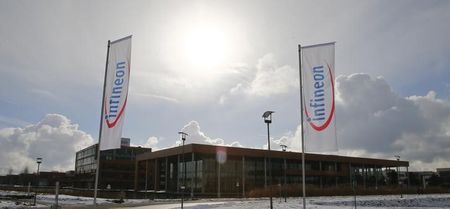FRANKFURT (Reuters) - Infineon brushed off concern that it was spending too much to buy U.S.-based International Rectifier, saying the deal promised a wealth of benefits for the German chipmaker.
Infineon announced the $3 billion (1.8 billion pounds)cash deal late on Wednesday. The price was 51 percent above International Rectifier's market value before it was announced and Infineon shares fell in after-hours trading.
"The premia (in the chip sector) are high, but the 50 percent we are offering is pretty much in the middle of the bandwidth in this space," Infineon finance chief Dominik Asam told analysts during a conference call on Thursday.
Asam said he saw "a good bunch of cost synergies" that made him comfortable with the premium Infineon has to pay, without giving more details.
Analysts said International Rectifier would strengthen Infineon's position in power management chips. But integrating the business would need to be flawless to generate the savings required to justify the price.
Infineon's chips activate car airbags, enable cruise control, manage power supplies and cut vehicle emissions. The company has shunned major takeovers since it was spun off from engineering conglomerate Siemens in 1999.
Confident it would make a success of the International Rectifier deal, Bernstein raised its rating on Infineon's shares to "outperform" from "market perform", saying it expected cost benefits of about $100 million.
Natixis analysts said they would "be watching closely, as Infineon's track record on M&A is limited and extracting major synergies will be key".
Infineon shares edged down 0.3 percent to 8.577 euros by 10.51 a.m. BST, while Germany's blue-chip DAX index was up 0.3 percent.
Asam said his team had looked at a "whole bunch" of possible acquisition targets before settling on International Rectifier.
"We approached another (target) but did not converge on price," he said, without naming the company. He said most other takeover candidates seemed too expensive.

Infineon said it expected International Rectifier's profitability to be "at least in line with" its own operating margin target of 15 percent by the second full fiscal year after the deal closes.
(Reporting by Maria Sheahan; editing by Jonathan Gould and Tom Pfeiffer)
3_800x533_L_1412602648.jpg)